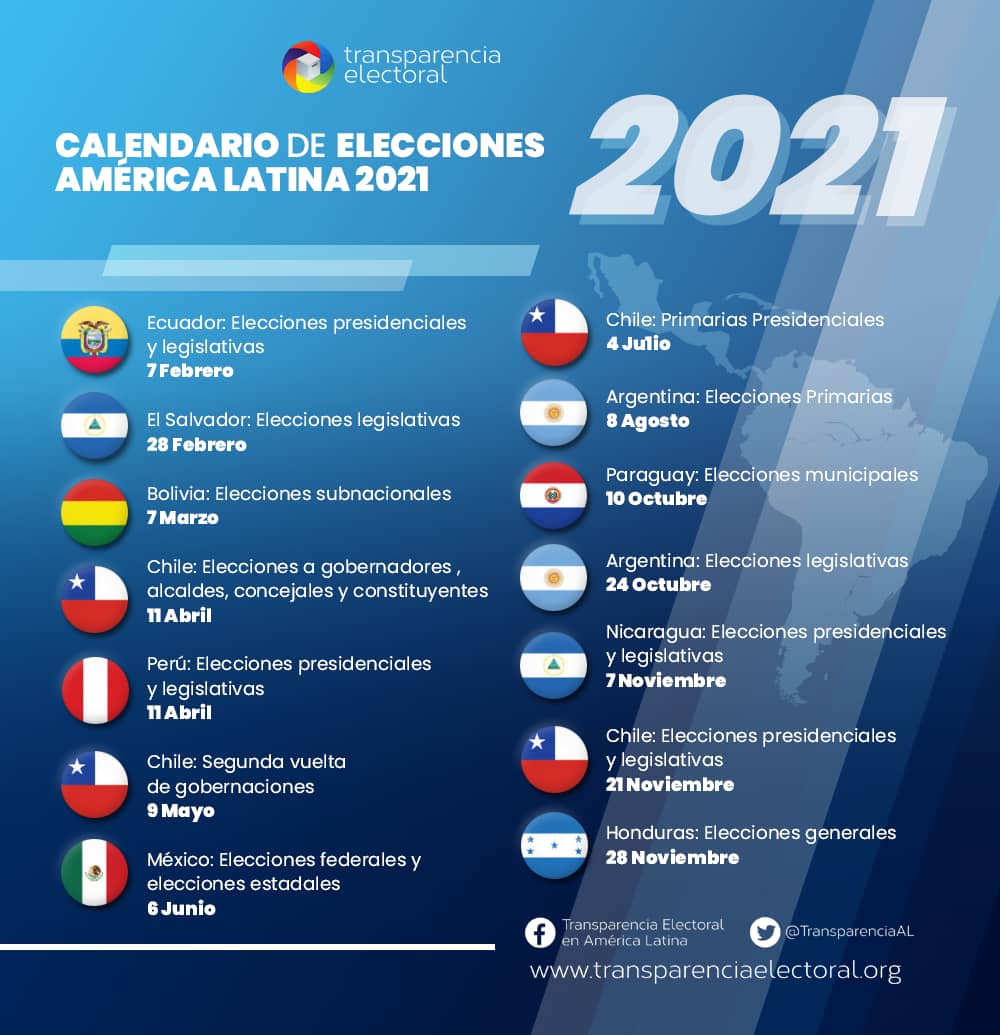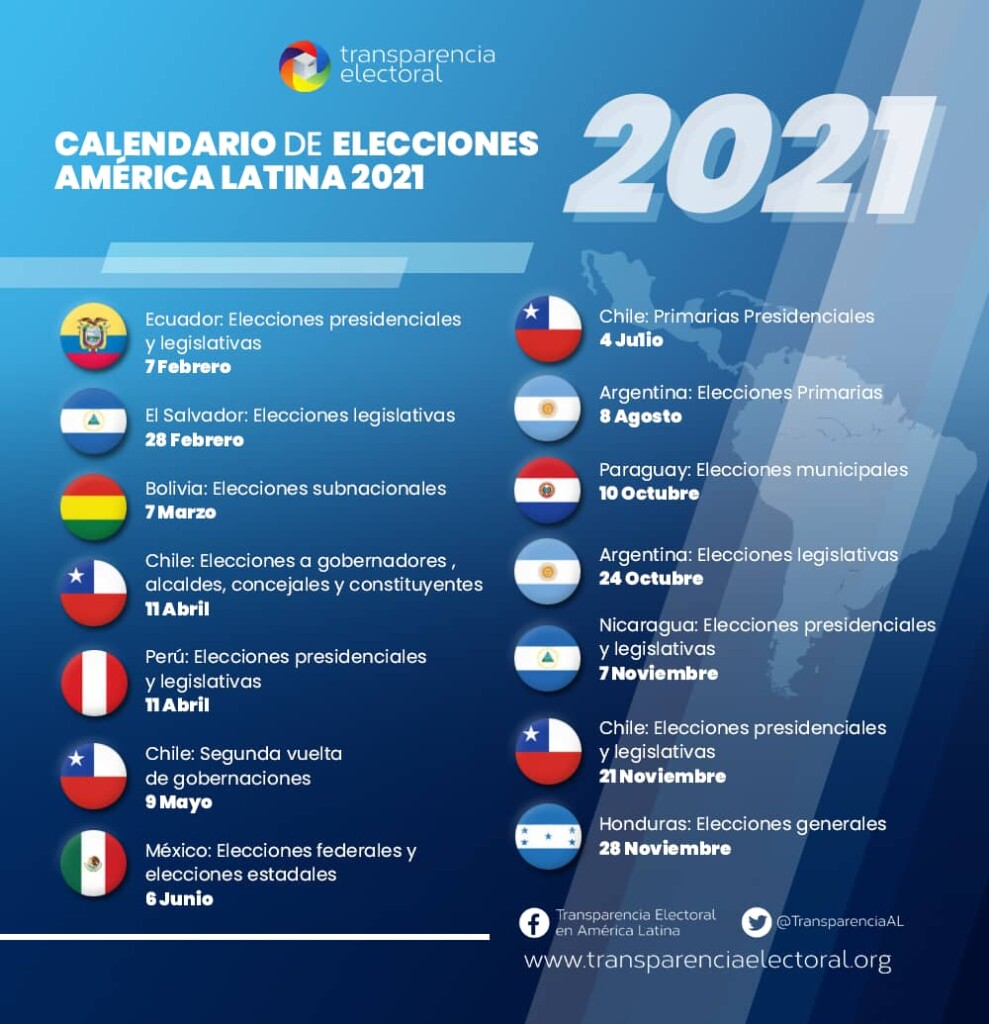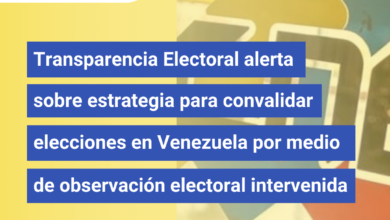2021 LATAM Election Calendar


In 2021, nearly 200 million voters from ten countries in Latin America will have a chance to elect representatives. To improve the speed, accuracy and transparency of the process, authorities will rely on a wide range of technologies.
Ecuador will be the first heading to the polls. Its general elections are scheduled for February 7, with a possible runoff presidential election in April. The National Elections Council will deploy optical scanners to digitize the ballots of approximately 13 million voters who will cast their votes on paper. This technology was implemented in Ecuador for the first time in the 2017 presidential elections. While voters exercise their franchise in a traditional way, the scanners speed up the counting of votes and the consolidation of results. Ecuador is considering piloting Internet voting for voters living abroad.
On February 28, El Salvador’s Supreme Tribunal of Elections will hold elections. Some 5.3 million Salvadorians will elect a 84 members of the Legislative Assembly and 262 mayors. Representatives for the Central American Parliament will also be selected. Although El Salvador conducts elections mostly manually, authorities have announced the use of a technology platform to process preliminary results.
Bolivia authorities have called sub-national elections in which governors, departmental assembly members, mayors and councilors will be elected. Though voters cast ballots manually across the country, authorities will use biometric voter authentication in some provinces to curb voter impersonation. Bolivia is slowly returning to normality after the controversial presidential elections of 2019 which led to the ousting of Evo Morales.
Honduras’ March 14 primary elections begin its preparation for its November 28 general elections. To streamline results publication, authorities will use a Transmission of Preliminary Results (TREP) system in 1,500 of 5,700-plus voting centers. Operators will make calls from polling centers to communicate the results, which are transcribed and consolidated to a ‘Call Center.’ In the general elections, some 6 million Hondurans will fill 3,000 seats for Congress, Central American Parliament, Mayors, Vice Mayors, Councilors and President.
Peru will hold general elections after a serious crisis that saw the consecutive resignations of four presidents and the dissolution of its congress. Authorities have cancelled plans to continue deploying its in-house-built electronic voting system. The National Office of Electoral Processes (ONPE) had been piloting voting technology since 2011, reaching 39 districts in 2020. Although the vote in 2021 will be completely manual, Peru will continue piloting technology, only this time it will be online voting for expatriates.
Chile conducts municipal, regional and the election of its Constitutional Convention on April 11. Although Chile has an established and well-regarded election administration ranked among the top three in Latin America according to The Economist index, the country historically has low voter turnout. The current president was elected in 2017 with less than 50% of the electorate participating. Local government elections in 2016 only 35% of those eligible voted. Leveraging technology to allow voters to participate from any polling station and implementing online voting could go a long way to increasing turnout.
Mexico will have the largest elections in its history on June 6. Its approximately 90 million voters will elect 500 congressional deputies and 21,383 positions among governorships, municipalities and mayors in the country’s 32 states. The day will see the launch of online voting for Mexican nationals abroad. Online voting is a tool that authorities hope to use nationwide in the near future.
Paraguay will head to the polls on October 10 to hold the municipal elections that had to postpone twice due to COVID-19. Ballot marking devices will be deployed nationwide to capture the vote of more than 5 million Paraguayans. This is not the first election authorities in Paraguay have attempted to modernize elections. In past elections, Brazil had lent its electronic voting machines for authorities to pilot the technology. However, this time around technology will be used nationwide in a binding election.
Argentina has scheduled legislative elections for October to renew the seats of 127 deputies and 24 senators. For this election, authorities will repeat its 2019 scheme of digitization and transmission of minutes that allowed them to streamline processing of provisional results.
For its part, Nicaragua has general elections scheduled for November 7 to choose a President, 90 members of the National Assembly and members of the Central American Parliament. The votes will be cast, counted and consolidated manually. A quick counting system will probably be used to speed up results.



